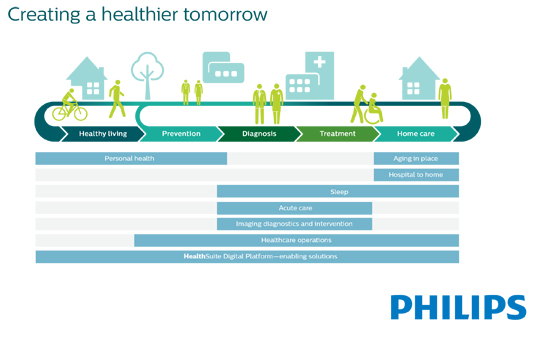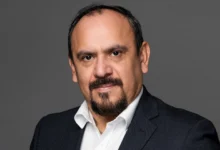Philips showcases its healthier innovations solutions at the Innovation Experience 2015

Around the globe, disruption, innovation, and the rapid pace of technological development is reshaping consumer experience, as well as the operating environment for organizations of all sizes and within every industry. The healthcare industry is no exception. Today, technological and business innovation is empowering companies and healthcare professionals to deliver medication, treatment, as well as more effective care to patients quicker, more efficiently than ever ultimately resulting in better healthcare that is accessible to many more people than ever before.
The latter is vitally important at Philips which strives to deliver personal, meaningful innovation that has a positive impact on people’s lives. The company showcased solutions that will help people live a healthier life, innovations that will make care highly personalized and more widely available to those who need it, and ways in which ground-breaking lighting solutions can create safer and more sustainable cities in Johannesburg during the opening of the Philips Africa Innovation Experience.
“Our mission is to improve the lives of 3 billion people by 2025. This is a bold and daring vision. But looking at the state of the world, it is a path worth taking,” JJ van Dongen, CEO, Philips Africa said.,
The Philips Africa Innovation Experience provided a glimpse into the future of healthcare and lighting; attendees were taken on an experiential tour through an immersive setting, showcasing how the healthcare industry is slowly becoming more agile, effective and more importantly, within a regional context – more cost-effective – for people on the African continent. The rapid transformation of the lighting industry and how LEDs are transforming the nature of lighting -how and where, artificial light is used to enhance the human experience were part of the overall experience.
“Innovation has been and will always be at the heart of Philips and the Africa Innovation Experience underlines how we are pushing the boundaries to improve people’s lives with a host of localized solutions and services. With a presence in Africa for over 100 years Philips is committed to providing effective, sustainable and value based solutions to the continent. We hope to inspire our customers and partners and demonstrate the steps we can take together to improve people’s lives across the continent.” Dongen added.
Thanks to advances in imaging and monitoring technologies, combined with rapid development in digital health data and cloud computing, Philips is leading the transformation of the healthcare industry and creating highly integrated, personalised care with better outcomes at lower costs.
As part of the experiential setting at the event attendees were also able to see solutions which are addressing the challenges in Africa. The solutions included Philips PulseRelief, an app-enabled TENS (Trancutaneous Electronic Nerve Stimulation) device that helps users choose and control personal treatment to relieve pain. PulseRelief offers a drug-free solution to help chronic pain sufferers manage their pain discreetly. The app optimizes use of the device and allows users to track their pain before and after treatment, and over time using their tablet or smartphone.
Another solutions displayed by Philips was VISIQ, a transducer-plus-tablet ultrasound system that delivers the image quality of a cart-based system. Ultra-mobile and easy-to-use, it allows clinicians to perform quality diagnostic obstetric, gynaecological and abdominal scans anywhere, from hospital labour rooms to remote, rural locations.
Philips also showcased Minicare Acute , a fully-automated handheld rapid diagnostic testing solution that can measure target molecules in very low concentrations (picomolar) in blood in a matter of minutes. Based on its proprietary Magnotech biosensor technology, the Minicare handheld diagnostic test can perform a wide variety of assays including hormones, drugs and proteins. The platform allows multiplexing capabilities making it possible to test for multiple markers from the same droplet of blood at the same time. The first application for acute care is cTnI (cardiac Troponin I). Philips aims to offer a full range of markers for the acute care setting
Empowering a healthy life
Worldwide, and particularly in the growing middle class in Africa, people are becoming more conscious of their personal health and well-being, and how they can make positive choices for a healthier lifestyle. Philips said it supports and catalyzes these developments, empowering people to live healthier lives through its innovations.
Philips showcased a series of personal health programs that empower consumers to take greater control of their health. Each health program comprises connected health measurement devices, an app-based personalized program and secure, cloud-based data analysis. The programs included Smarter Cities, as the global leader in lighting, Philips is taking light beyond illumination. By connecting LED lighting to sensors, controls, networks, devices and apps Philips enables its customers to create amazing new lighting experiences and to achieve outstanding business outcomes while saving up to 80% on energy. Philips is taking lighting into a fully digital world in which it connects people, places and devices and creates safe and sustainable homes and public environments.
Philips also showcased its Philips Power-over-Ethernet (PoE) connected office lighting system it launched recently. The system gives facility managers, office workers, and building owners smartphone control of their office lighting, and building managers new insights into building usage.
The system acts as an information pathway, enabling workers to access and control services – such as lighting and heating via their smartphones, allowing them to enjoy greater visual comfort and productivity.
The Philips Innovation Experience Africa 2015 showcased numerous other solutions that will help people live a healthier life, innovations that will make care highly personalised and more widely available to those who need it, and ways in which innovative lighting and health-tech solutions can create safer and more sustainable cities.



